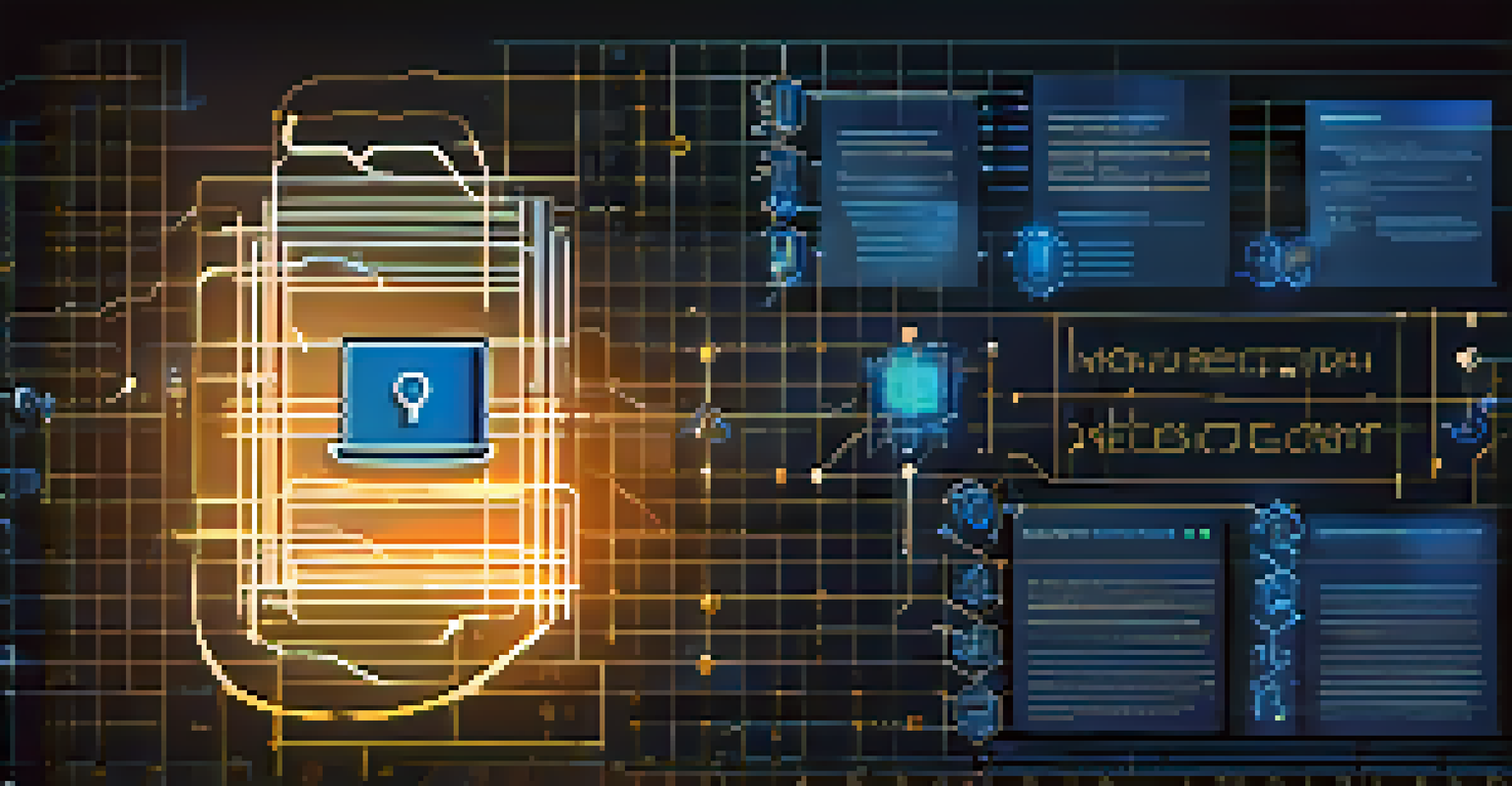Ethereum's Smart Contracts: A New Era for Data Ownership

What Are Smart Contracts and How Do They Work?
Smart contracts are self-executing contracts with the terms directly written into code. They run on the Ethereum blockchain, ensuring transparency and security. Essentially, they automate agreements, eliminating the need for middlemen and reducing the risk of fraud.
Smart contracts are a revolution in the way we think about agreements and transactions.
Imagine a vending machine: you insert money, choose a product, and the machine automatically dispenses it. Smart contracts function similarly; they execute actions when predefined conditions are met, all without human intervention. This process is not only efficient but also trustworthy.
By leveraging smart contracts, individuals and businesses can streamline their operations, making transactions faster and more reliable. They represent a shift towards a decentralized future, where control lies in the hands of users rather than centralized authorities.
The Role of Ethereum in Smart Contract Development
Ethereum is the leading platform for developing smart contracts, thanks to its robust infrastructure and extensive developer community. Unlike Bitcoin, which primarily serves as a digital currency, Ethereum was designed with programmability in mind, enabling complex transactions and applications.

This unique capability allows developers to create diverse applications, from decentralized finance (DeFi) platforms to non-fungible tokens (NFTs). The flexibility of Ethereum's programming language, Solidity, also plays a significant role, making it accessible for developers to bring their ideas to life.
Smart Contracts Automate Agreements
Smart contracts streamline transactions by executing predefined actions automatically, reducing the need for intermediaries.
Moreover, Ethereum's ongoing upgrades, like Ethereum 2.0, aim to enhance scalability and security, further solidifying its position as the go-to platform for smart contracts. This evolution ensures that Ethereum remains at the forefront of the blockchain revolution.
How Smart Contracts Empower Data Ownership
Data ownership has traditionally been a murky area, often controlled by corporations and centralized entities. Smart contracts offer a way to reclaim this ownership by giving users full control over their data. With blockchain technology, individuals can now manage their personal information securely and transparently.
With smart contracts, we can create a world where trust is built into the system, not just between individuals.
For example, consider a scenario where you share your medical records with a healthcare provider. With smart contracts, you can dictate who accesses your data and for how long. This level of control not only improves privacy but also fosters trust between users and service providers.
Furthermore, by owning their data, users can potentially monetize it, creating new revenue streams. This shift signifies a democratization of data, where individuals are no longer passive consumers but active participants in the digital economy.
Real-World Applications of Smart Contracts
Smart contracts are already making waves across various industries, showcasing their versatility. One prominent application is in supply chain management, where they enhance transparency by tracking products from origin to consumer. This ensures that all parties have access to real-time information, reducing fraud and inefficiencies.
Another example is in the real estate sector, where smart contracts can simplify property transactions. By automating agreements, they eliminate lengthy paperwork and reduce closing costs, making the process smoother for buyers and sellers alike.
Ethereum Powers Smart Contracts
Ethereum serves as the leading platform for smart contract development, enabling diverse applications through its robust infrastructure.
Additionally, the rise of DeFi platforms highlights how smart contracts can revolutionize finance. By allowing peer-to-peer lending and borrowing without intermediaries, they empower users to manage their finances on their terms.
Challenges and Limitations of Smart Contracts
While the potential of smart contracts is immense, they are not without challenges. One major concern is the security of the underlying code. If a smart contract contains vulnerabilities, it can be exploited, leading to significant financial losses. Thus, rigorous testing and auditing are crucial to ensure their reliability.
Another challenge is the legal recognition of smart contracts. As they operate in a decentralized environment, establishing their enforceability in traditional legal systems can be complex. This ambiguity can deter businesses from fully embracing the technology.
Finally, the scalability of blockchain networks poses limitations. As more users interact with smart contracts, the network can become congested, leading to slower transaction times and higher fees. Addressing these challenges is essential for the widespread adoption of smart contracts.
The Future of Data Ownership with Smart Contracts
Looking ahead, the future of data ownership with smart contracts appears promising. As more individuals and organizations recognize the benefits of decentralization, the demand for smart contracts will likely grow. This shift could lead to innovative solutions that empower users and enhance data privacy.
Moreover, with advancements in technology, we can expect improvements in the scalability and security of blockchain networks. These enhancements will make it easier for businesses to adopt smart contracts, paving the way for widespread integration across industries.
Data Ownership is Revolutionized
Smart contracts empower individuals to regain control over their data, enhancing privacy and fostering new opportunities for monetization.
Ultimately, the rise of smart contracts represents a significant step towards a more equitable digital landscape. By giving individuals control over their data, we can foster a future where privacy and transparency are prioritized.
Conclusion: Embracing the Smart Contract Revolution
In conclusion, Ethereum's smart contracts are ushering in a new era of data ownership that empowers individuals and reduces reliance on centralized entities. By automating agreements and enhancing transparency, they offer a transformative approach to transactions and data management.
As we continue to navigate the complexities of the digital world, embracing smart contracts can lead to greater security and control over personal information. This shift not only benefits individuals but also creates a more efficient and trustworthy ecosystem for businesses.

The journey is just beginning, and with ongoing advancements in blockchain technology, the potential for smart contracts is limitless. By understanding and utilizing this powerful tool, we can collectively shape a more decentralized and equitable future.